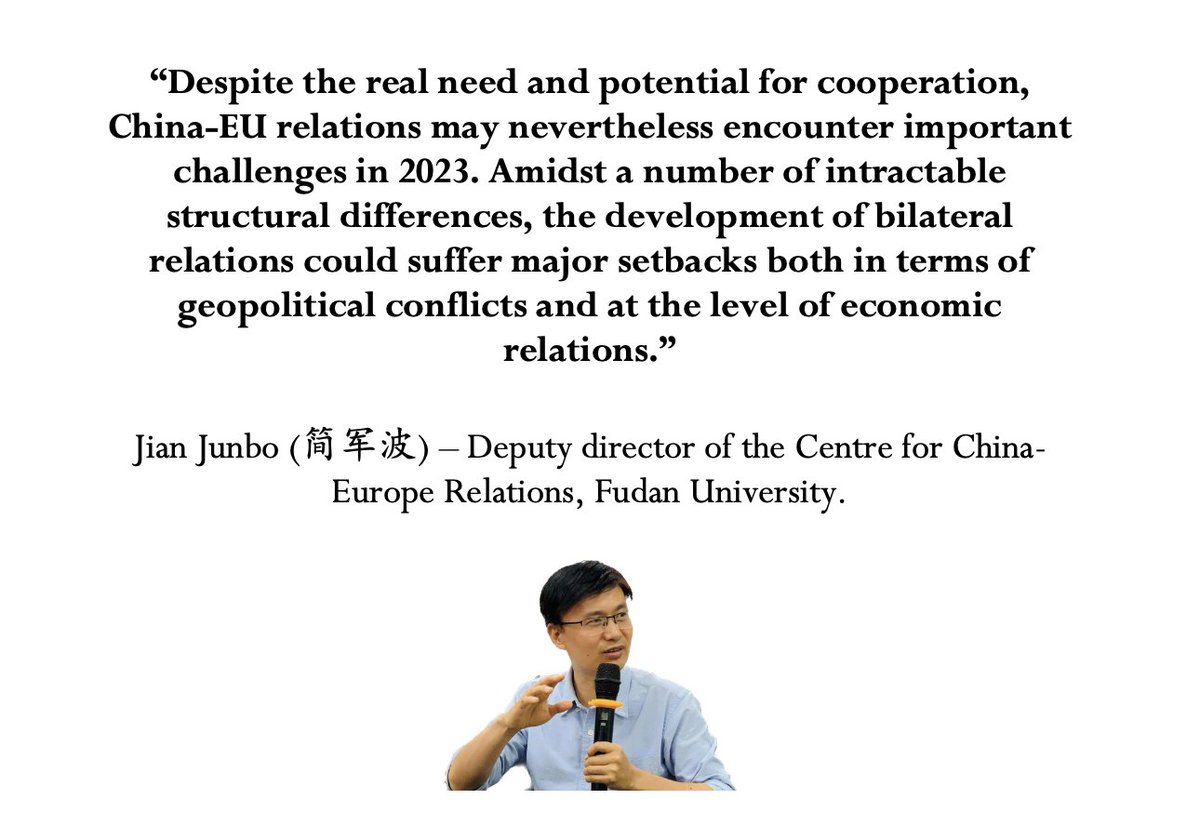
Fudan Prof. Jian Junbo (简军波) discusses the European Union's #StrategicAutonomy, 🇪🇺-🇨🇳 relations in 2023 and provides his government with a few suggestions.
THREAD 🧵
THREAD 🧵

🔹EU #StrategicAutonomy according to Jian:
1. Benefits the development of #EU-#China relations by freeing the EU from the influence of “third parties” (i.e. the US).
2. In line with China’s desire for a multipolar world order.
However...
1. Benefits the development of #EU-#China relations by freeing the EU from the influence of “third parties” (i.e. the US).
2. In line with China’s desire for a multipolar world order.
However...
3. EU strategic autonomy also has a strong anti-#China element to it.
📢 “It is a double-edged sword for 🇪🇺-🇨🇳 relations and is to a certain extent an important causal factor in the conflict over 'values' between China and Europe."
📢 “It is a double-edged sword for 🇪🇺-🇨🇳 relations and is to a certain extent an important causal factor in the conflict over 'values' between China and Europe."

4. Outlook:
The EU’s desire for greater strategic autonomy is still present. However, the #UkraineWar has had a negative impact on its development.
The EU’s desire for greater strategic autonomy is still present. However, the #UkraineWar has had a negative impact on its development.
🔹EU-China relations in 2023 – Predictions:
1. The EU’s recent tilt towards the #UnitedStates will remain and EU-China relations may suffer.
sinification.substack.com/p/eu-china-rel…
1. The EU’s recent tilt towards the #UnitedStates will remain and EU-China relations may suffer.
sinification.substack.com/p/eu-china-rel…
📢 “The difference in stance taken by the EU and China on the #UkraineRussiaWar️ has led to a growing distrust of China and, to a certain extent, to a closer alignment with the US's position on China.” 

2. #Europe is too weak to jeopardise its economic ties with China. The pull of the Chinese market will remain. However, the EU’s shoring up of its supply chains and decoupling from China in certain areas is expected to continue.
3. The #EU and its member states may strengthen their relations with #Taiwan, #Japan and other Indo-Pacific countries, and may continue to interfere in China’s “internal affairs”.
4. Potential areas of cooperation still abound.
4. Potential areas of cooperation still abound.
🔹Jian's suggestions:
1. Against the backdrop of 🇨🇳-🇺🇸 rivalry, #Beijing should place its relations with Europe as one of its top foreign policy priorities.
2. Despite their increasing closeness, China should make sure not to equate Europe with the #USA.
1. Against the backdrop of 🇨🇳-🇺🇸 rivalry, #Beijing should place its relations with Europe as one of its top foreign policy priorities.
2. Despite their increasing closeness, China should make sure not to equate Europe with the #USA.
3. Beijing should do its upmost to ease tensions and not provoke conflicts with actors at all levels in #Europe (不主动激发矛盾) on condition that China’s core national interests are not at stake.
4. China should consider focusing its efforts both on those member states that are “friendlier” (更为友好) towards China and on those countries that have a considerable impact on 🇪🇺-🇨🇳 relations (e.g. #France, #Germany and members of the Visegrad Group).
5. When #China’s core interests are involved, Beijing should be ready to fight back by adopting countermeasures at the economic and diplomatic levels.
📣 For more on this and other topics as viewed by Chinese scholars and think-tank analysts:
sinification.substack.com/p/eu-china-rel…
sinification.substack.com/p/eu-china-rel…
• • •
Missing some Tweet in this thread? You can try to
force a refresh









